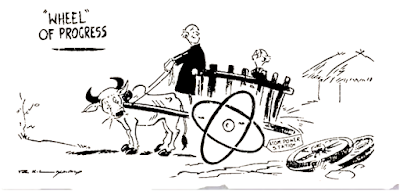1. A. Apsara
(The top view of the reactor "APSARA")
India's and Asia's first nuclear
reactor, "Apsara" (a highly versatile swimming pool-type of research reactor)
first went critical on 4 August 1956. Later, on January 20, 1957, the reactor
was dedicated to the nation and was named "APSARA" by then PM of
India Pandit Jawaharlal Nehru.
(A
caricature by R.K. Laxman following the inauguration of "APSARA" by Pt.
Nehru in 1957)
Located within India's nuclear weapons
facility at the Bhabha Atomic Research Center (BARC) in Mumbai, the Apsara
reactor has been utilised for various experiments including neutron activation
analysis, radiation damage studies, forensic research, neutron radiography, and
shielding experiments. The research reactor facility provides much needed
isotopes for medical purposes and also helps refine the design of India's
nuclear weapons.
The reactor was shut down in 2009 for
revamp and was turned on again in 2018.
2. B. Kalpana Chawla
METSAT - 1 (renamed as "Kalpana -
1" on February 5, 2003 after the Indian born American Astronaut Dr.
Kalpana Chawla, who died on February 1, 2003 in the US Space Shuttle Columbia
disaster) is the first in the series of exclusive meteorological satellites
built by ISRO. It was launched by ISRO using Polar Satellite Launch Vehicle (PSLV-C4)
into the Geostationary orbit on 12 September 2002.
('Kalpana-1' satellite)
Kalpana-1 went out of service in mid-2018.
3. B. Jyoti Basu
India’s baby steps to its mobile
revolution were taken on July 31, 1995, when then West Bengal CM Jyoti Basu
made the first mobile call to Sukh Ram, the then-Union Communication Minister
through India’s first mobile operator, Modi Telstra (later called Spice
Telecom).
The call was made between Writer's
Building in Calcutta and Sanchar Bhavan in New Delhi and was carried over Modi
Telstra's MobileNet service.
4. A. Shanti Swaroop Bhatnagar
The Council of Scientific and
Industrial Research (CSIR) was established in September 1942 as an autonomous
body and has emerged as the largest research and development organization in
India. CSIR has a dynamic network of 38 national laboratories, 39 outreach
centres, 3 Innovation Complexes and 5 units at present. The research and
development activities of CSIR include aerospace engineering, structural
engineering, ocean sciences, life sciences, metallurgy, chemicals, mining,
food, petroleum, leather and environmental science. In terms of Intellectual
property, CSIR has 2971 patents in force internationally and 1592 patents in
force in India. CSIR is granted more than 14000 patents worldwide since its
inception.
Sir Shanti Swaroop Bhatnagar (21 February
1894 – 1 January 1955), an Indian colloid chemist, academic and scientific
administrator was the first Director-General of the Council of Scientific and
Industrial Research (CSIR). He is revered as the "Father of Research Laboratories"
in India. He was also the first Chairman of the University Grants Commission of
India (UGC). In 1958, to honour his name and legacy, CSIR instituted the Shanti
Swarup Bhatnagar Prize for Science and Technology for scientists who have made
significant contributions in various branches of science.
5. A. Ashutosh Mukherjee
Indian Science Congress Association
(ISCA) is a premier scientific organisation of India having membership of more
than 30,000 scientists with its headquarters at Kolkata, West Bengal. The
association started in 1914 in Kolkata and it meets annually in the first week
of January. The Indian Science Congress Association (ISCA) owes its origin to
the foresight and initiative of two British chemists - Professor J. L. Simonsen
and Professor P. S. MacMahon.
(Logo of Indian Science Congress Association)
The first session of Indian Science
Congress was held in 1914 at the premises of Asiatic Society in Calcutta. Honorable
justice Sir Ashutosh Mukherjee, the then Vice Chancellor of the University of
Calcutta presided over the Congress. The centenary edition of Indian Science
Congress was also held at Kolkata hosted by the University of Calcutta in 2013.

















No comments:
Post a Comment